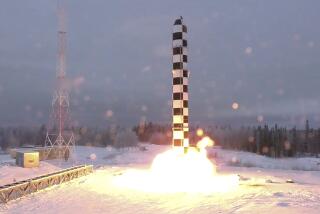Soviet Buildup Feared if Arms Pact Fails : Rejection Would Give Moscow Free Hand, Carlucci Tells Senators
- Share via
WASHINGTON — Senate refusal to ratify the new intermediate-range nuclear weapons treaty would probably give the Soviet Union a free hand to carry out a massive buildup of SS-20 missiles and other arms targeted on Europe, with the United States unable to match them, Defense Secretary Frank C. Carlucci said Monday.
“We would have unilateral implementation of the treaty, because the Soviets would have no counterpart obligation to take down their systems,” he told the Senate Foreign Relations Committee.
As two Senate panels began their second week of hearings on the pact, Carlucci called for ratification of the agreement signed by President Reagan and Soviet leader Mikhail S. Gorbachev on Dec. 8. He also urged Congress to approve modernization of both conventional forces and short-range nuclear arms in Europe.
Until there is a balance of conventional forces of the North Atlantic Treaty Organization and the Warsaw Pact, Carlucci said, the United States should resist any pressure to negotiate removal of remaining nuclear weapons in Europe--about 4,000 warheads on airplanes, short-range missiles, air- and sea-launched missiles and in artillery shells. None of these are included in the new agreement, which covers ground-launched missiles with a range of 300 to 3,000 miles. To negotiate away these remaining nuclear forces, he declared, “would be a disaster.”
Carlucci’s warning that the United States could not resume deployment of Pershing 2 ballistic missiles and ground-launched cruise missiles in Europe if the treaty was rejected was based on the furious political controversy that attended the original deployment of the intermediate-range arms. Considering the political sensitivity of the issue and the strong opposition of the European peace movement, European countries might not accept the missiles, he said.
The original deployment came in response to the Soviet Union’s fielding of the triple-warhead SS-20, and treaty supporters generally agree that it led to the Soviet acceptance of the treaty banning the mid-range nuclear missiles.
Since the treaty signing at the Reagan-Gorbachev summit, the Soviets have suggested that modernization of shorter-range nuclear weapons would amount to a circumvention of the treaty, but the defense secretary dismissed the assertions as “propaganda.”
‘Right to Modernize’
“The Soviet charges of circumvention on nuclear modernization are pure propaganda,” he told the committee. “The negotiating record is very clear on that point, that both sides have a right to modernize. They’re clearly going to modernize their systems. We have to.
“It’s vitally important that we get on with modernization; it’s vitally important that we get on with the conventional defense initiative.”
These plans, and other adjustments, are to be discussed soon at a meeting of the NATO Nuclear Planning Group in Denmark. Among the options under consideration is to improve the 70-mile-range Lance missile.
Retired Gen. Bernard W. Rogers, a former NATO commander and an outspoken opponent of the treaty, agreed with Carlucci that its rejection by the Senate would have devastating consequences.
“Once the United States has said that these weapons are not needed for the defense of Europe . . . I don’t know one leader, with the possible exception of (Prime Minister Margaret) Thatcher in Great Britain, who would support deployment on their soil,” Rogers told the Senate Armed Services Committee.
The “major adverse impact” of rejection, he said, would include a shattering of NATO cohesion, undermining both political and military solidarity.
It generally is conceded that the treaty will be ratified by a large margin on the Senate floor.
So far only Sen. Jesse Helms (R-N.C.) has made a major effort to derail the agreement, charging, among other things, that it is filled with loopholes and that the Soviets could have a hidden force of SS-20 missiles far in excess of the 650 it acknowledged in the negotiations.
“Somewhere, somehow, sometime, we have to put an end to this euphoria that this is an end-all, be-all and cure-all,” he said Monday.
More to Read
Sign up for Essential California
The most important California stories and recommendations in your inbox every morning.
You may occasionally receive promotional content from the Los Angeles Times.













